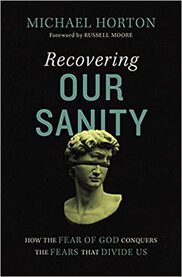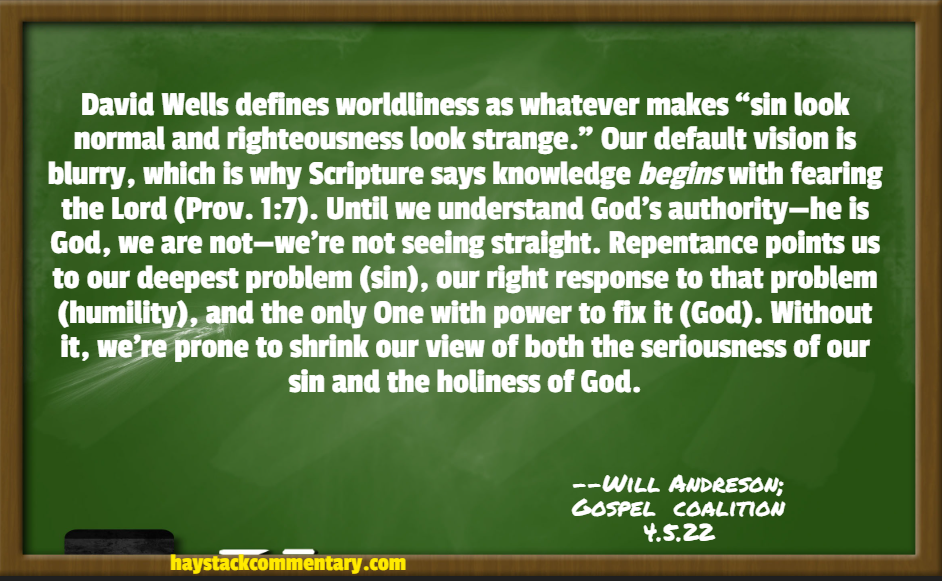Proverbs 1:7 |
Proverbs 1 |
|
Proverbs 1:7:
7 The fear of the LORD is the beginning of knowledge: but fools despise wisdom and instruction. |
The Greek idea of “Wisdom” was a grander thing; it meant a clear insight into the eternal order of the world. In more modern terms, it meant the knowledge of God. But it had its defects. The God that was sought after was too much of an Intellectual Infinite, and too exclusively apprehended by the intellectual. Hence the dictum that the highest wisdom was a kind of intellectual contemplation in which the mind transcended appearances and looked right into the heart and the reality of things. Even by the Greek this wisdom was held with a strong element of of ethical apprehension and feeling. The ethical factors were presupposed even when not expressly stated, for the Greeks declared that knowledge was virtue, and it was clear that the knowledge which is virtue is ethical at the heart of it. But the intellectual and metaphysical predominated too much in the Greek system; the transcendence and sovereignty of the ethical element was not made clear and emphatic, and Greek wisdom at the last generated into a jingle of syllogisms. Yet the Greek had much of the truth of the world and many of the sons of Greece lived strong and heroic lives through the wisdom that God had revealed to them. When their old truths were ready to vanish away, God was already preparing to send them the higher wisdom, the wisdom revealed in Christ. |

Recovering Our Sanity: How the Fear of God Conquers the Fears that Divide Us" by Westminster Seminary theologian Michael Horton.
“The fear of God is living with the grain of reality. … We did not make ourselves, so it is insane to live as though we could be whatever and whomever we choose. We do not belong to ourselves, but to God.”
“The Fear to End All Fears,” sets out the Scriptural basis for a proper fear of God.
“All of our fears come down to this one: we are afraid of Someone knowing our deepest secrets, cherished transgressions, and failures to fulfill our chief end.”
"Don’t mistake God’s kindness and patience as a sign that he is either unable or unwilling to unleash his wrath. Even now, there may be some reading this who have lived around Noah’s ark all your life, so to speak. You have camped around it and played in its shadow and on its scaffolding, even as this barge of salvation was being built. But you have never entered the ark. Like an old coin, your religion is something you carry around in your pocket. It even has an image of Christ, but this image has lost its embossing and is now faded."
“When we raise our eyes to heaven, something strange happens to us. Fears of our circumstances, including life, vocations, and the condition of the environment, are so moderated that we are able to engage in stewardship with hopeful responsibility instead of utopianism or despair.”
“The fear of God is living with the grain of reality. … We did not make ourselves, so it is insane to live as though we could be whatever and whomever we choose. We do not belong to ourselves, but to God.”
“The Fear to End All Fears,” sets out the Scriptural basis for a proper fear of God.
“All of our fears come down to this one: we are afraid of Someone knowing our deepest secrets, cherished transgressions, and failures to fulfill our chief end.”
"Don’t mistake God’s kindness and patience as a sign that he is either unable or unwilling to unleash his wrath. Even now, there may be some reading this who have lived around Noah’s ark all your life, so to speak. You have camped around it and played in its shadow and on its scaffolding, even as this barge of salvation was being built. But you have never entered the ark. Like an old coin, your religion is something you carry around in your pocket. It even has an image of Christ, but this image has lost its embossing and is now faded."
“When we raise our eyes to heaven, something strange happens to us. Fears of our circumstances, including life, vocations, and the condition of the environment, are so moderated that we are able to engage in stewardship with hopeful responsibility instead of utopianism or despair.”
|
Ecclesiastes 12:13 - Let us hear the conclusion of the whole matter: Fear God, and keep his commandments: for this is the whole duty of man.
|
Proverbs 14:26 - In the fear of the LORD is strong confidence: and his children shall have a place of refuge.
|
Proverbs 14:27 - The fear of the LORD is a fountain of life, to depart from the snares of death.
|
Proverbs 8:13 - The fear of the LORD is to hate evil: pride, and arrogancy, and the evil way, and the froward mouth, do I hate.
|

In this verse we are also introduced to the fifth character in the introduction of Proverbs, and one of the central characters of the book – “the fool.” Always used in the Bible with a negative connotation, it does not suggest someone mentally deficient, but someone who is morally deficient, someone who make inappropriate choices.
The fool says in his heart that there is no God (Ps 14:1), so, it is no surprise that this verse says a fool despises both wisdom (see :2) and discipline (see :2, 3). Fools make conscious decisions to not connect with God – even though He is there and working in their lives all the time, anyway. -Helping UP Mission
The fool says in his heart that there is no God (Ps 14:1), so, it is no surprise that this verse says a fool despises both wisdom (see :2) and discipline (see :2, 3). Fools make conscious decisions to not connect with God – even though He is there and working in their lives all the time, anyway. -Helping UP Mission

In today’s world, there is plenty of knowledge out there. Just look at the growth of the internet. Many of us use our smartphones more than our computers to find answers to our questions.
This is not the kind of knowledge that Solomon is referring to. Wisdom is so much more than having a head full of knowledge. As you can read in the verse above, the knowledge Solomon refers to is combined with wisdom and discipline. That means wisdom is linked to the basic attitudes we develop.
Furthermore, Solomon is telling us that as we honor and respect God, we find ourselves wanting to know more about God, his kingdom, his son, his word (the Bible), and all that he has to teach us about life.
As we recognize God’s power and glory, we grow into faith. Our faith in God helps us to understand the world around us. It helps us to understand the actions we take to live a good life, as well as the attitudes that mark our character. It is by putting our trust in God that we develop true wisdom. -Kathy Brumbaugh
This is not the kind of knowledge that Solomon is referring to. Wisdom is so much more than having a head full of knowledge. As you can read in the verse above, the knowledge Solomon refers to is combined with wisdom and discipline. That means wisdom is linked to the basic attitudes we develop.
Furthermore, Solomon is telling us that as we honor and respect God, we find ourselves wanting to know more about God, his kingdom, his son, his word (the Bible), and all that he has to teach us about life.
As we recognize God’s power and glory, we grow into faith. Our faith in God helps us to understand the world around us. It helps us to understand the actions we take to live a good life, as well as the attitudes that mark our character. It is by putting our trust in God that we develop true wisdom. -Kathy Brumbaugh

The important difference here is that fear, in this context, is a verb. That’s right. Fear can be used as a catalyst for good. During the time that much of the Bible was written, it was customary to enter the palace of a king, or to approach an authority figure, by bowing and humbling yourself. ‘Fearing God’ is acting in humility to show honor and respect to God. Fearing God is clarified further in these verses from 1 Peter 5:6-7, “Humble yourselves, therefore, under God’s mighty hand, that he may lift you up in due time. Cast all your anxiety on him because he cares for you.”
Consider this acronym for FEAR: faith eternal and reverence. We can fear God and still have love, faith and hope (1 Corinthians 13:13). As I tell my counseling clients, you don’t need to live in a state of being afraid, you can use fear to overcome. As Paul so eloquently says, “That is why, for Christ’s sake, I delight in weaknesses, in insults, in hardships, in persecutions, in difficulties. For when I am weak, then I am strong” (2 Corinthians 12:10). -Andrew McCleary; Life fellowship
Consider this acronym for FEAR: faith eternal and reverence. We can fear God and still have love, faith and hope (1 Corinthians 13:13). As I tell my counseling clients, you don’t need to live in a state of being afraid, you can use fear to overcome. As Paul so eloquently says, “That is why, for Christ’s sake, I delight in weaknesses, in insults, in hardships, in persecutions, in difficulties. For when I am weak, then I am strong” (2 Corinthians 12:10). -Andrew McCleary; Life fellowship
References to the “fear of God” occur many times in Scripture. It is a phrase easily misunderstood, for to fear something or someone brings to mind the impulse to flee or to avoid whatever or whoever causes our fear. Yet this fear of the Lord is closely connected in the Bible with a true and abiding love of the Lord. A foundational text is Deuteronomy 6, in which the Hebrews are told three times to “fear the Lord your God” (Dt 6:2, 13, 24), but are also commanded to love the one true God: “… and you shall love the LORD your God with all your heart, and with all your soul, and with all your might” (Dt 6:5).
This loving fear of God is also closely intertwined with wisdom—“Fear of the Lord is the beginning of knowledge” (Prov 1:7) and with true life—“The fear of the LORD is a fountain of life” (Prov 14:27; cf. Prov 19:23). Examples abound, but this is enough to provide background to the first reading, in which the worthy wife is praised for many things, all of which are rooted in her fear of the Lord (Prov 31:30). As the notes to the New American Bible explain, this fear is “primarily a disposition rather than the emotion of fear; reverential awe and respect toward God combined with obedience to God’s will.”
This is why the prophet Isaiah listed the fear of the Lord as one of the seven gifts of the Spirit of God (Isa 11:2-3; CCC, 1831). This fear is, paradoxically, a vibrant awareness of who we are in the eyes of a loving God; it is also a recognition of the duties that come with being gifted with God’s mercy and grace. It means that those who have a proper fear of God are spiritually awake and aware, prepared for the day of the Lord that St. Paul wrote about to the Christians in Thessalonica. Those who are filled with the Holy Spirit are “children of the light” and “children of the day” who do not sleep as others do—that is, who are spiritually vigilant and alert.
Today’s Gospel makes mention of fear, but it is a different fear. The parable of the talents is about three servants entrusted by their departing master with different amounts of money. Each sum is quite large; it’s likely that a “talent” was equal to up twenty years of wages. The first two servants used their talents (yes, this is why the term “talent” refers to abilities or gifts) to produce a profit. But the third went and buried his single talent in the ground. Why? When asked by his angry master, he explained that he has acted “out of fear”.
The master’s angry, damning response is shocking, and we are tempted to think he is overreacting. But here we see the difference between a holy, righteous fear, and a doubtful, faithless fear. The former acts out of love for God, and is fearless for the sake of the Kingdom; the latter is paralyzed and without faith, lacking love. We must, as a great Saint taught, fear God from love. --Carl Olson
This loving fear of God is also closely intertwined with wisdom—“Fear of the Lord is the beginning of knowledge” (Prov 1:7) and with true life—“The fear of the LORD is a fountain of life” (Prov 14:27; cf. Prov 19:23). Examples abound, but this is enough to provide background to the first reading, in which the worthy wife is praised for many things, all of which are rooted in her fear of the Lord (Prov 31:30). As the notes to the New American Bible explain, this fear is “primarily a disposition rather than the emotion of fear; reverential awe and respect toward God combined with obedience to God’s will.”
This is why the prophet Isaiah listed the fear of the Lord as one of the seven gifts of the Spirit of God (Isa 11:2-3; CCC, 1831). This fear is, paradoxically, a vibrant awareness of who we are in the eyes of a loving God; it is also a recognition of the duties that come with being gifted with God’s mercy and grace. It means that those who have a proper fear of God are spiritually awake and aware, prepared for the day of the Lord that St. Paul wrote about to the Christians in Thessalonica. Those who are filled with the Holy Spirit are “children of the light” and “children of the day” who do not sleep as others do—that is, who are spiritually vigilant and alert.
Today’s Gospel makes mention of fear, but it is a different fear. The parable of the talents is about three servants entrusted by their departing master with different amounts of money. Each sum is quite large; it’s likely that a “talent” was equal to up twenty years of wages. The first two servants used their talents (yes, this is why the term “talent” refers to abilities or gifts) to produce a profit. But the third went and buried his single talent in the ground. Why? When asked by his angry master, he explained that he has acted “out of fear”.
The master’s angry, damning response is shocking, and we are tempted to think he is overreacting. But here we see the difference between a holy, righteous fear, and a doubtful, faithless fear. The former acts out of love for God, and is fearless for the sake of the Kingdom; the latter is paralyzed and without faith, lacking love. We must, as a great Saint taught, fear God from love. --Carl Olson


